State in Treaty
BackArtists
- With
Information
„In 2005 Austria commemorated the founding of the Second Republic, the war years, its development after the State Treaty and above all the festive act of its signing. It was practically impossible to avoid the celebrations. The committee for kunst im öffentliche raum niederösterreich (art in the public space in Lower Austria) initiated a poster action that made direct reference to the celebrations connected with the signing of the State Treaty. For the project, nine international artists were invited to take up a position on the subject of the State Treaty and design a poster connected with it.
The poster series was presented in June 2005 at an opening event in Klosterneuburg and hung afterwards in the local communities in Lower Austria and distributed as a brochure. The posters were put up at key locations involved in the State Treaty celebrations and aroused great interest both there and within the local communities. In the course of the summer the posters developed into collectors items of a special kind. We had not expected such lively interest in the rather difficult and complex themes which formed the subject-matter of the posters. This encouraged us in our attempt to repeatedly present unconventional and difficult artistic work in public space. The citizens showed their appreciation with unusually positive reactions. We were well aware of the difficulties involved, connected to the multi-layered nature of the topic, the implementation of the project and the challenge presented by the subject-matter. This is perhaps not the appropriate place to express our gratitude to the artists, but they showed a great deal of courage both in the contributions that they made and in agreeing to participate in what proved to be a rather delicate undertaking.“ (PRINZGAU/podgorschek)
Contributors
- Kuration
Contributions
A Room of One's Own
The group of female artists a room of one's own has been working together on a number of different projects since 2001. Its central concerns are the extension of networks and the subject of political practices inside and outside the field of art. For the project they took a topical phenomenon. Austria liked to (and still likes to) see itself as the first victim of National Socialism, basically as 'not having done anything'. Overhasty obedience and Catholic stigma always go hand in hand and tend to be considered commendable rather than exposed to scorn. It is precisely this mass of expansionist fanatics, candidates for suicide and calculated victimisation that the members of the group a room of one's own seek to stir up.
Fatih Aydoǧdu
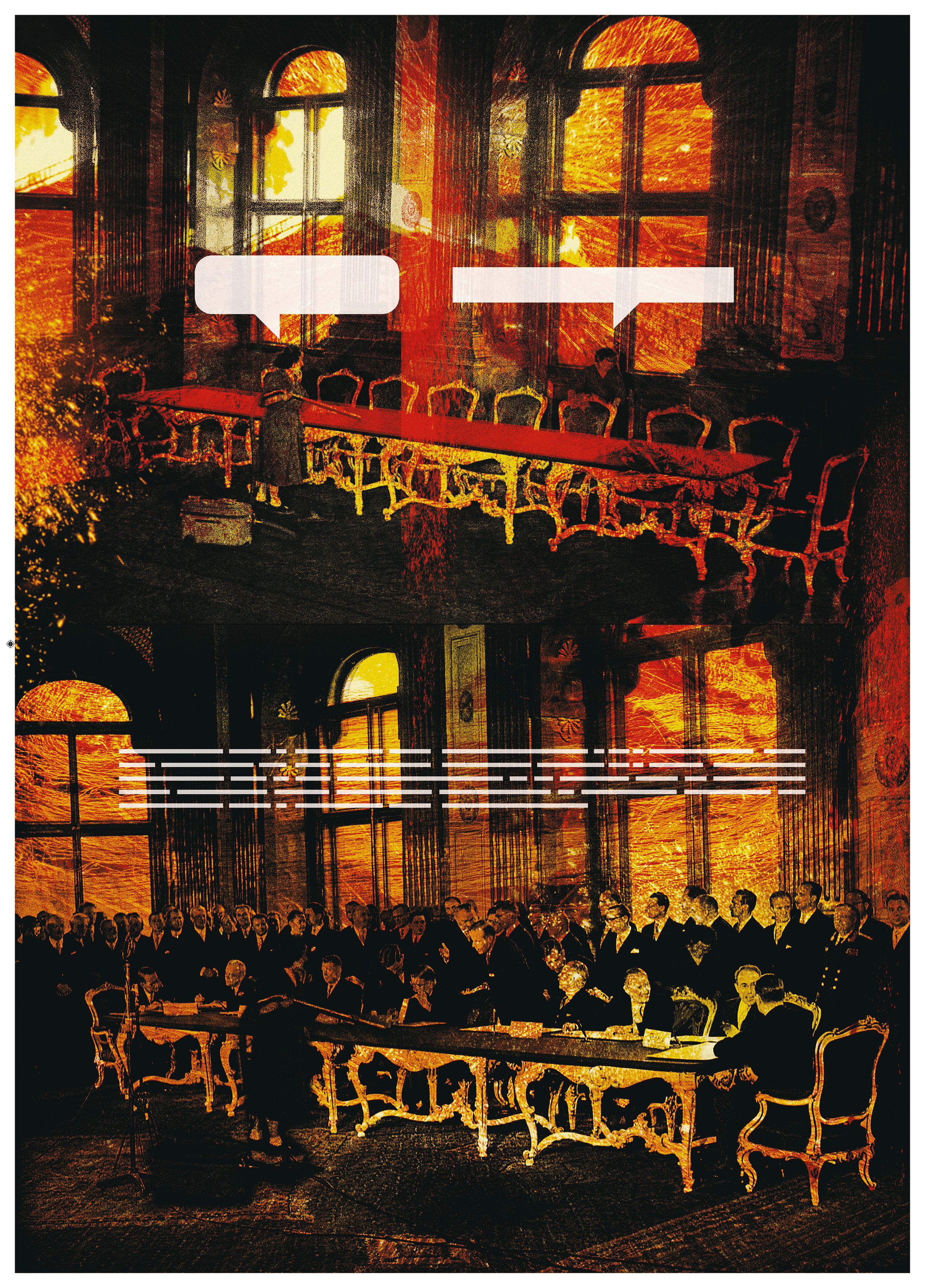
Fatih Aydogdu is above all well known for his critical analysis of the linguistic construction of national identity. The 'Bone of the Tongue' (Dilin Kemigi) is the title of an exhibition that Aydogdu designed together with Sandra Droschl and Norbert Pfaffenbichler for Diagonale 05. The title refers to the Turkish proverb 'The tongue has no bones' and is a polysemous reference to freedom of speech (dil = tongue, language). In the work Speech he takes as his starting material a long-playing record for a language course from the 1970s, with the title 'Deutschpraktikum für Türken' (German Practice for Turks). "The pressure of linguistic assimilation is a further feature of ideology that is transported together with the language course," says Fatih Aydogdu. His work challenges people to question cultural assumptions, simplifications and demands on the linguistic level. In his work 'Das Vertragszimmer' (The Treaty Room) he leaves us behind with two empty speech bubbles and some bar code strips. The cleaning personnel were present both before and after the signatory act. In the case of both pictures, it is a matter of legendary photographs of a historical event. There were lists of those present. The two women do not appear in it.
Martin Gostner
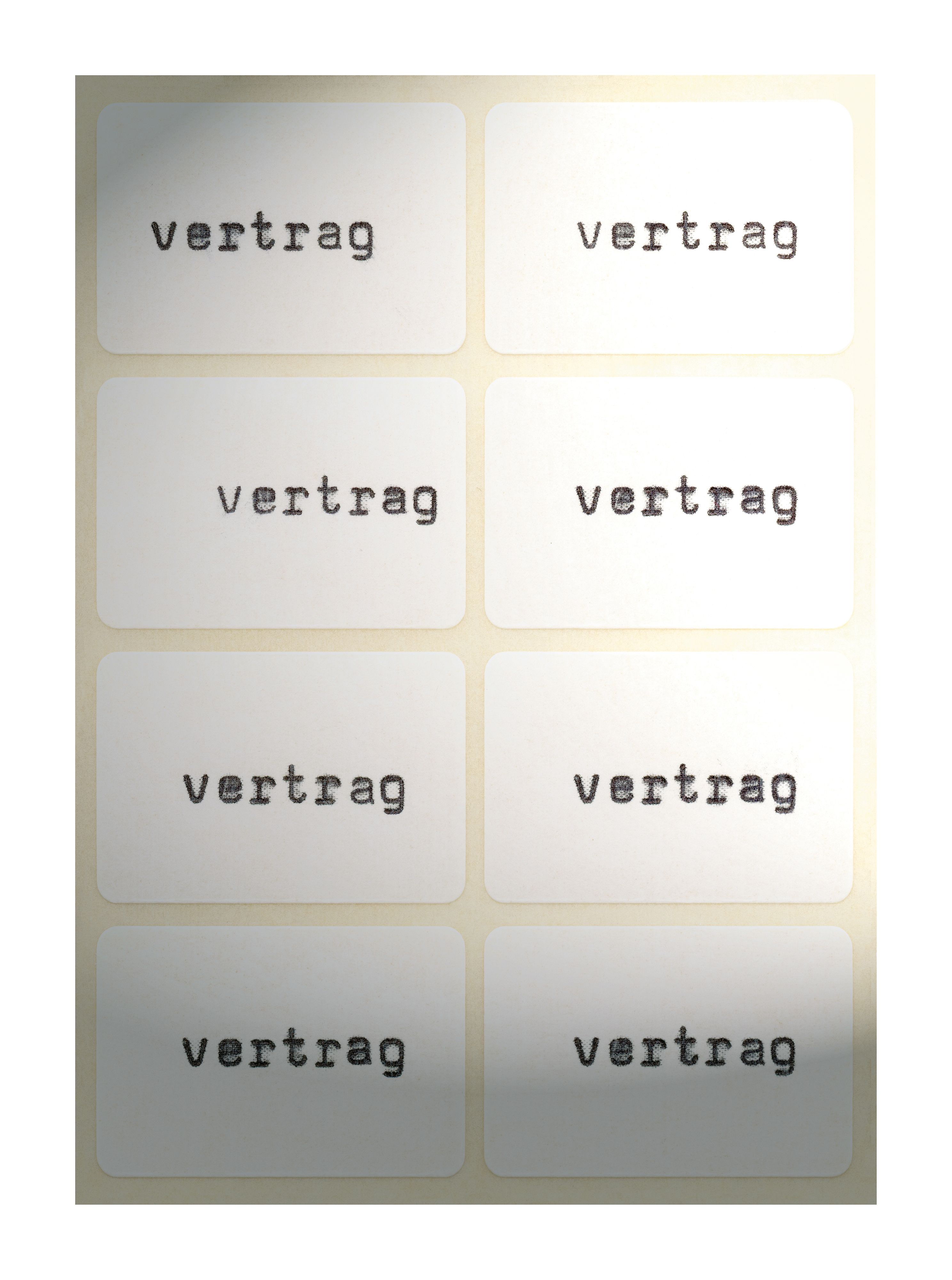
Characteristic of many of the word-text works by Martin Gostner is the way in which a word charged with meaning dissolves in a gesture of repetition. Removed from their context, lined up next to one other as in a collage and endlessly repeated, the words in Gostner's work alternate between text and image. For Staat im Vertrag, Gostner vicariously provides the nation with labels in an ironically bureaucratic gesture: the word 'Vertrag' ('Treaty'), written in typewriter lettering, which is no longer common today, already refers to a certain subject-matter beyond its form and representation, a certain story, that can be interpreted biographically and historically. Gostner's contribution functions by means of a cipher which is directly accessible to the generation that grew up immediately after the signing of the State Treaty. As in his previous work, the lettering chosen by Gostner, the motif of labelling as well as the statements concerning the content, show that he is working not by insistence upon a notion, but by detachment from meaning and context.
Andreja Kulunčić
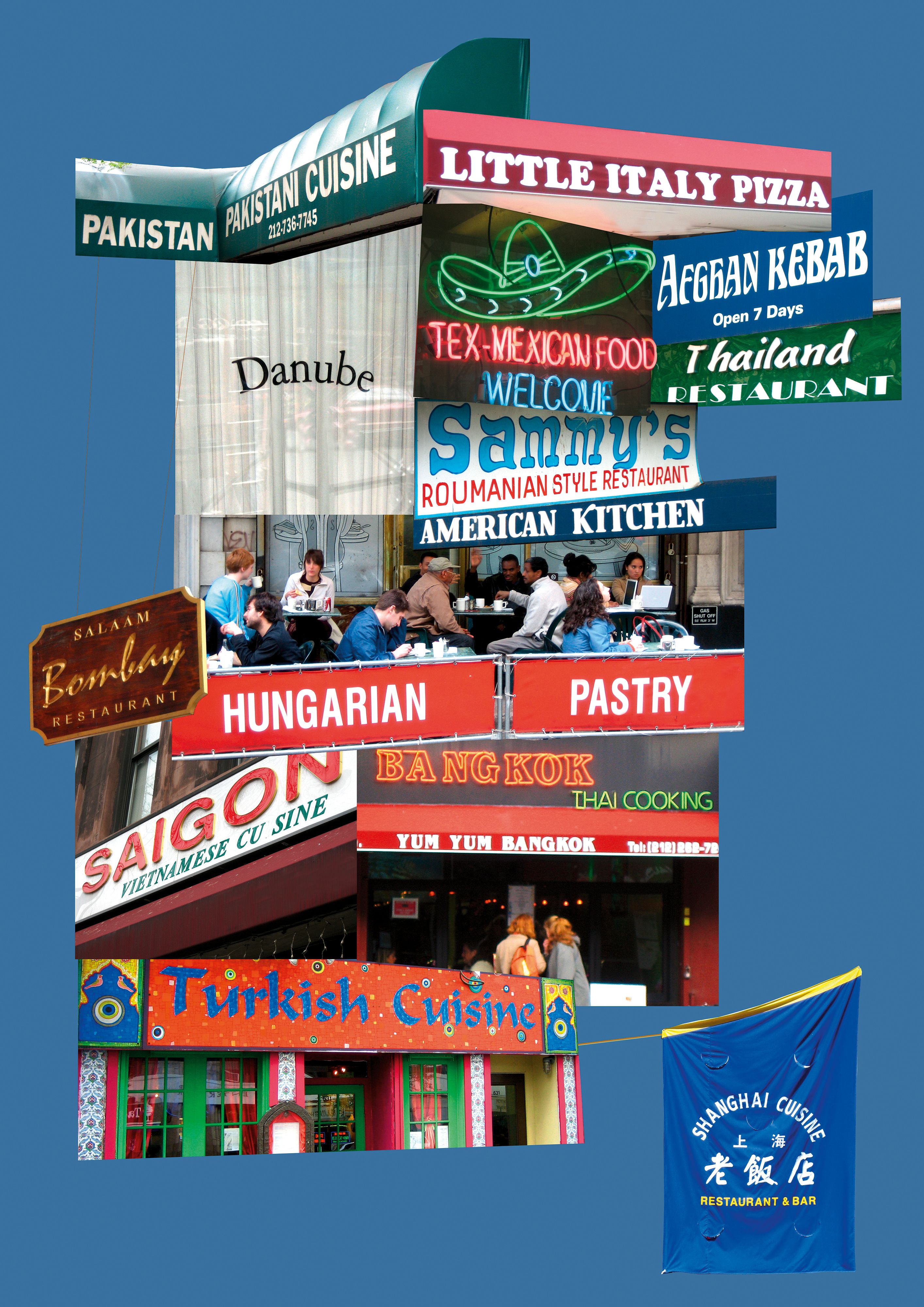
Andreja Kuluncic's works are socio-political explorations, associative patchworks of image and text which question social and political conditions. The poster by Andrea Kuluncic consists of signatories, scripts, signs, and flags used in restaurant names of various origins, such as Saigon, Bombay, Bangkok, Little Italy Pizza etc. The worldwide corporate identity of fast food chains suggests a global connection. Dynamic handwriting suggests a national back connection which no longer exists. The internationally familiar optical attributes of screaming advertisements for cheap food are collaged by Andreja Kuluncic on a blue background in a kind of fictive modern architecture. In her text she draws attention to the hope that the fear of the new in relation to foreigners can be overcome by means of multinational food, and consequently speaks of the possibility of a better world. A better world – but going where? In this form, what is foreign is a familiar guest. To return to the period of the State Treaty: Coca-Cola is one of these guests, and those who gulp their Coke are also tolerant to genetically modified foodstuffs. And that, perhaps, is what Andreja Kuluncic is concerned about: the manipulation of our everyday life.
Jonathan Quinn
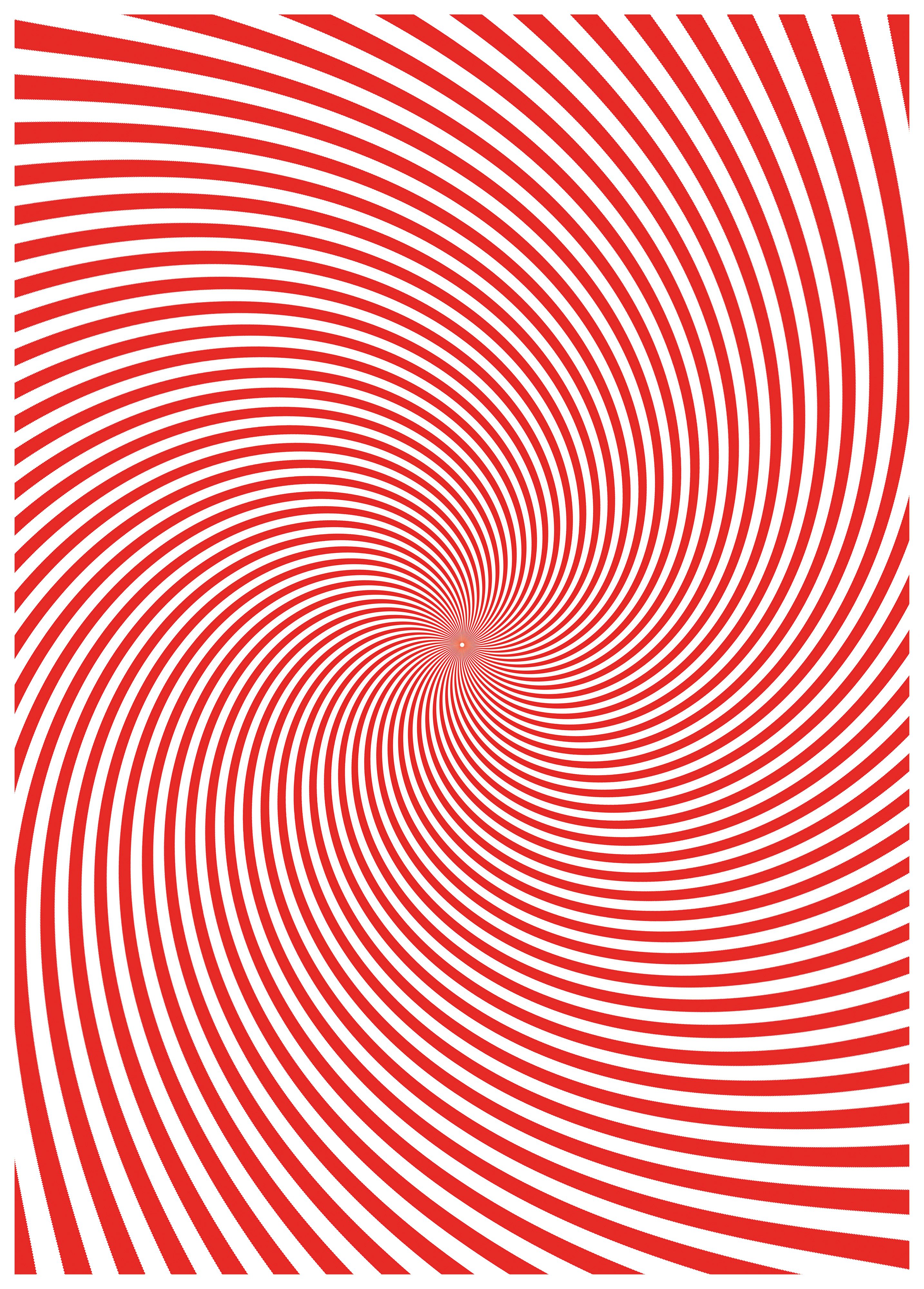
It is kinetic Austria which Jonathan Quinn is interested in. The individual within the population becomes a racing Dervish polka, proceeding from a middle, the centre and developing into a never-ending dance of joy in red-white-and-red. Even in his early work ehnix (cos it's nothing anyway) (2001) he reconstructed with the simplest means, namely a piece of wire, objects for an interior. A local interior decoration, 'weil es ist ja eh nix', a designation that is frequently encountered in Austria for things that are actually significant. In at home (2004) the party becomes even more elegant. The spectators' attention and sensitivity is challenged by a set of furniture created with hardly visible fishing line which traces the outlines of pieces of furniture, held in place by the counterweight of a mass of chewing gum. "In this way the cocktail party comes to an end, the informal formality of home is presented with the exhibition as a past protective space. The production space for art becomes the museum."* Alles Walzer! ? the individuals have not taken their places on the fictive beds, but are dancing towards their notorious dissolution between the folds of the poster.
Anna Artaker, Meike Schmidt-Gleim
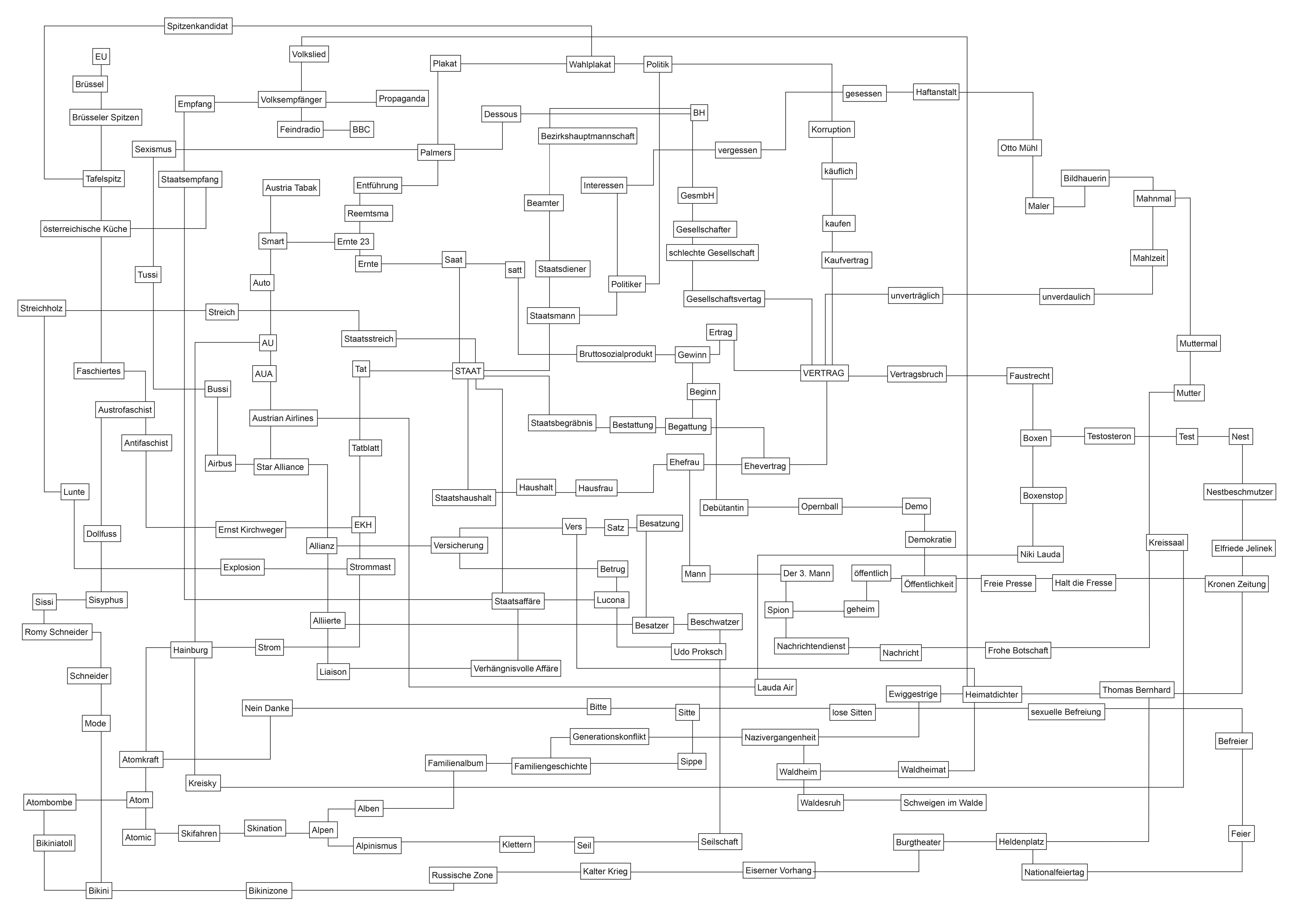
The project is entitled Staat im Vertrag (State in Treaty) and these words were what the two artists Anna Artaker and Meike Schmidt-Gleim took as the starting point of their research. It might be useful to know that these two women do not only have an artistic training, they are also philosophers, and that words and their interpretation and contextual combination are part of the tools of their trade. They ironically call their activity Etymogelei, (pseudo- or quasi-etymology), although the final product of their work tends to be highly-polished precision material. Let us begin with ‘State': "STAAT-Tat-Tatblatt-EKH-Strommast-Strom-Hainburg-Kreisky" (?STATE-act-Tatblatt-EKH-electricity-pylon-electricity-Hainburg-Kreisky'). Doing some skilful mental gymnastics, the reader is taken through clearly structured events of the recent Austrian past. The content of every single word can be traced, allowing numerous conclusions: eight words or eight chapters of recent historiography. And whoever starts out from 'Treaty' and arrives, via "Gesellschaftsvertrag-schlechte Gesellschaft-Ges.m.b.H-BH-Dessous" (?Social treaty – bad society – Ltd. – bras) at Palmers, knows what is intended. And also "of course knows how it probably could/would/must continue ad infinitum". In a workshop given at the Generali Foundation in Vienna in 2004, which was declared to be a "test workshop and collecting point", Meike Schmidt-Gleim took the title "I want to be a feminist" in order to see "gestures, signs, codes, tricks and grimaces not only as habits but also as facets of belonging, solidarity and collectiveness". The project by Anna Artaker and Meike Schmidt-Gleim is likewise organised as a test workshop and collecting point – it is up to the viewers to find their own personal way through the structures and associative chains of thought provided by the artists.
David Thorne
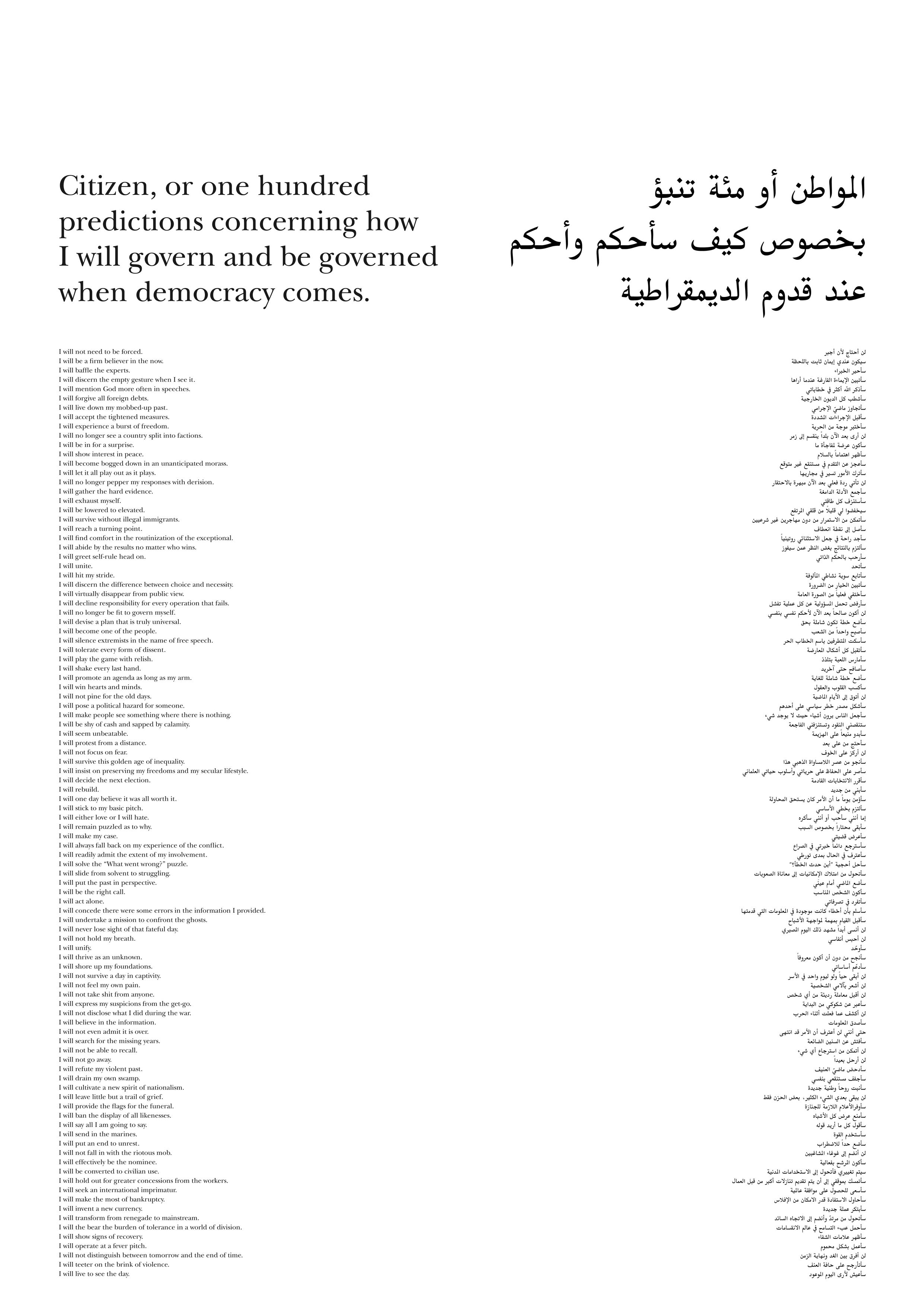
'I will put the past in perspective' is Item No. 58 of David Thorne's 100 predictions for the time "when democracy comes". The artist David Thorne was born in Los Angeles but is currently living and working in Damascus. His work Citizen quotes the possible hopes and fears of the citizens who live there in a context of an anticipated political democratisation: "I will shake every last hand. / I will experience a bust of freedom. / I will not go away. / I will make the most bankruptcy. / I will thrive as an unknown. / I will not be able to recall..." David Thorne's work documents and reflects current political discourse, and in doing so refers critically not only to its structures and mechanisms, but also to the concrete effects of the same on real social conditions. Among other things, together with Julia Meltzer he is working on the project The Speculative Archive (www.speculativeproject.org). "Our project seeks to open a space for a contemplation of violence through a revisualization of historical and contemporary documents. We approach political violence not through its most visible effects, but rather through its documentary forms and procedures." The wide range covered by the 100 predications for possible democracy reads like a 'who's what' of survival. Item 75 would then be 'I will search for the missing years'.
Jun Yang
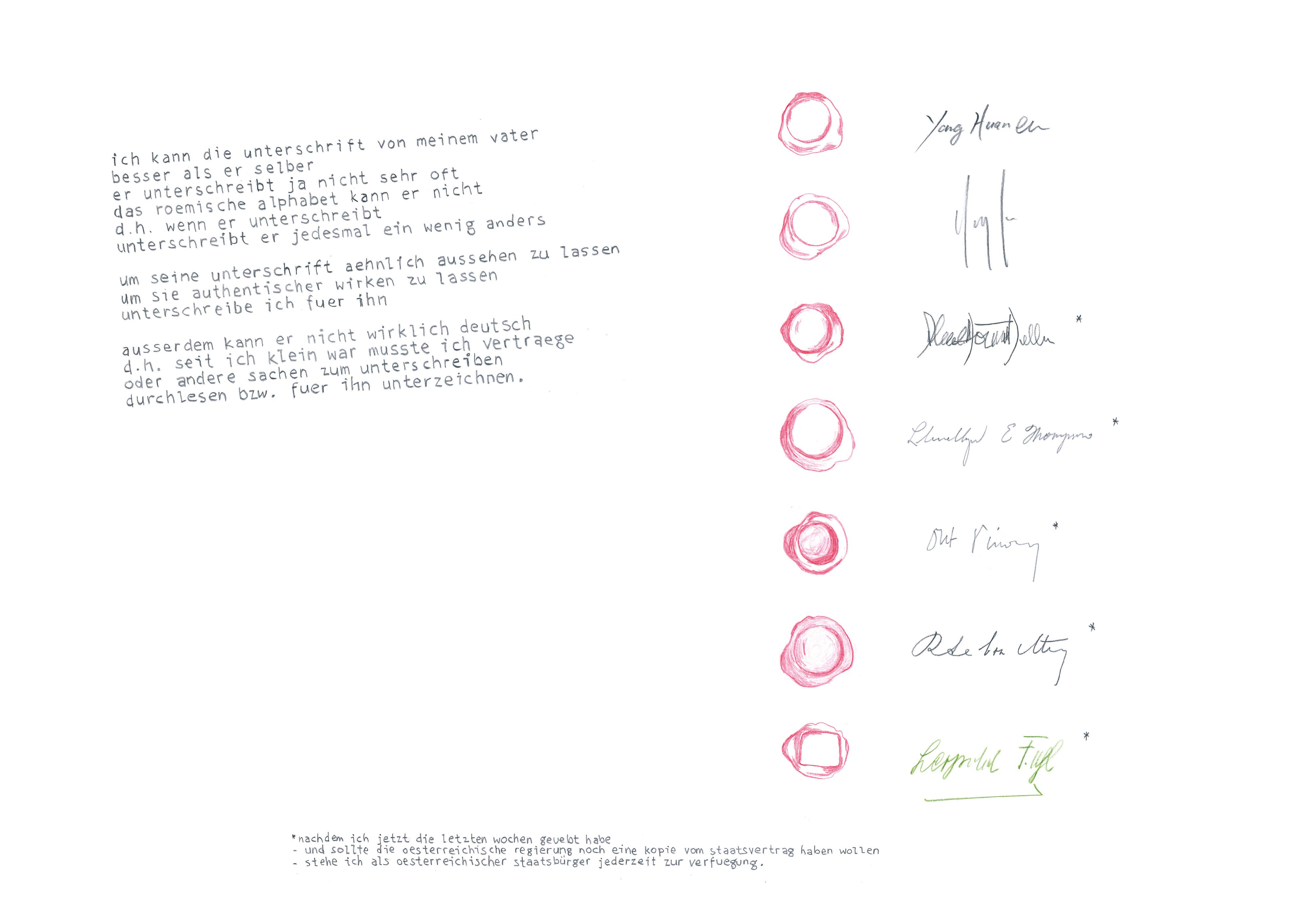
Jun Yang's works are often concerned with ceremonial patterns of behaviour, which are embedded in a standardised everyday culture and their reciprocal effect on the individual. Individual experiences and personal biography are linked with public rituals and motifs that reflect the individual as a social subject. For Jun Yang, who offered his signature as an Austrian citizen, the project Staat im Vertrag was an enjoyable challenge. He took the matter seriously, and planned for the future. Our attempts at falsification in our childhood failed because of a lack of family support or because they were not very highly regarded at school. In this way these skills declined over the years... even Jun Yang had to practice – from W. M. Molotow, A. Pinay, J. F. Dulles to Figl. Masterfully and with a great deal of irony, the winner of the 2005 Otto-Mauer Prize combines the individual experiences of his childhood with the big societal event of the year 1955.
Július Koller
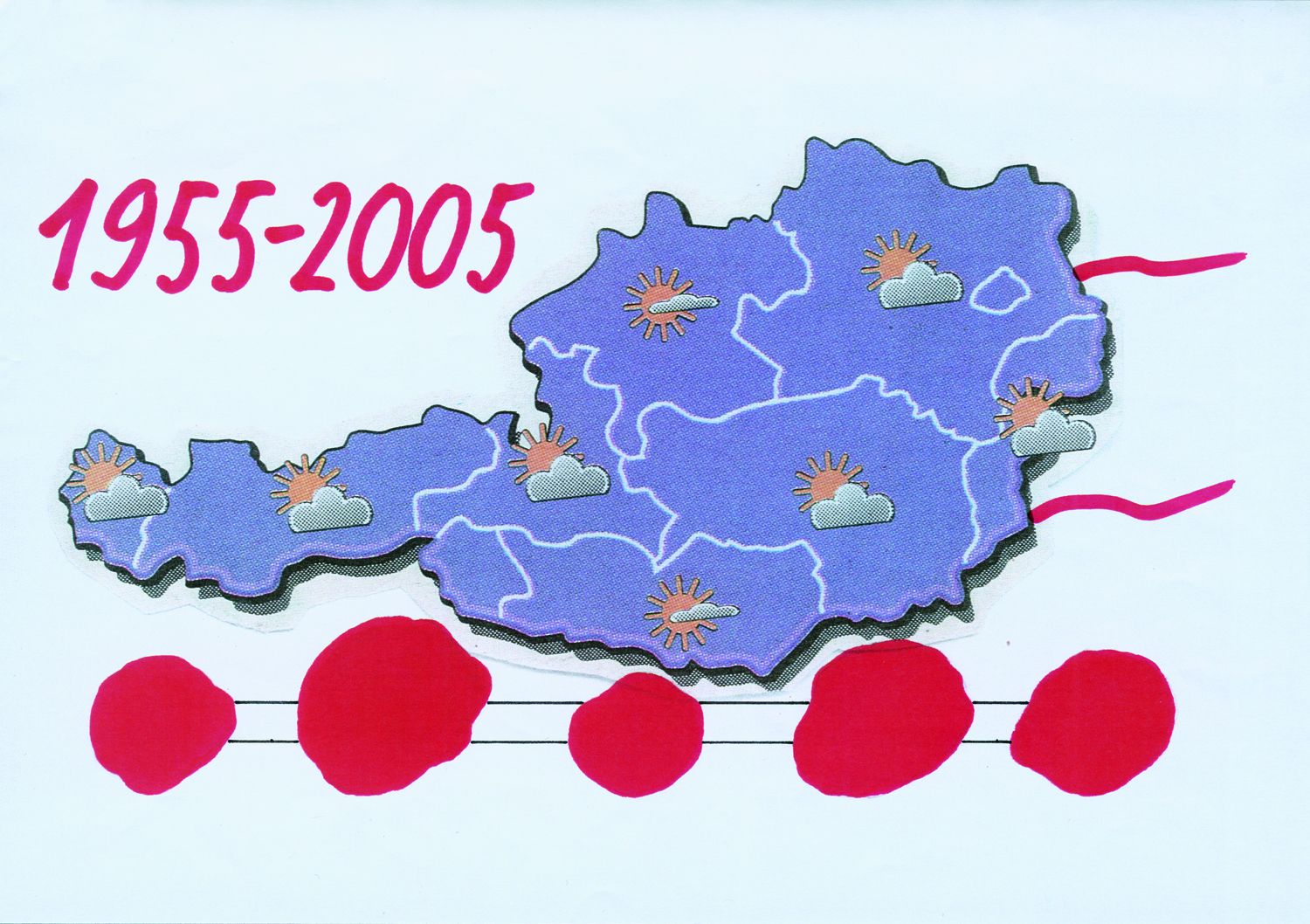
"50th anniversary of sunny Austria as a free, independent and democratic state, which advances with the little wax wheels of the seals on the international State Treaty of 1955. " (Julius Koller)
The little wax wheels of the seals on the State Treaty, which advance rather clumsily, hobbling over the lost lines of a writing pad's ruler sheet, a school relic from the time when the State Treaty was being drawn up and for many of this generation an object of special use in coming to terms with past. Behind a map of the worlds, presumably cut out from a small format, i.e. a piece of everyday Austrian life, are the waves of the Austrian flag dynamically depicted in graphic form and all together playing with the irony of the onset of lasting good weather. The sheet has the appropriate commemorative lettering.
"Since the mid-1960s, Julius Koller has developed an oeuvre that is characterised by an equally stringent, erratic and yet playful irony, between universal inclination and scepticism. This work by Julius Koller, who at the time of the 'normalisation' at the start of the 1960s was one of the main representatives of an unofficial Slovakian art scene (which was placed under a repressive ban of invisibility by the Communist regime after 1968) develops less in a linear direction and more in loops and in interlocking continuations, reversing the various influences of the period in the form of 'Anti-Happenings', 'Anti-Pictures', 'Anti-Environments'." (Georg Schöllhammer) With this 'Anti-Poster Work' on the State Treaty he is still trying to advance the little wheels of the manifesto of the 'Anti-Happening' (System of Subjective Objectivity), which he formulated in 1964, and subjectivises the system, complacently rolling in the direction of ironic representation (of the State), while maintaining the best possible objectivity.
Images (8)








